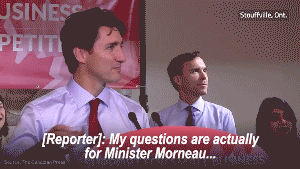The Prime Minister’s tax reform damage control tour
In Stouffville, Ont., Trudeau took over from Bill Morneau, unveiling a tax cut and some new messaging around an unravelling tax plan
Prime Minister Justin Trudeau speaks to members of the media at a press conference in Stouffville, Ont., on Monday, October 16, 2017. (Nathan Denette/CP)
Share
Finance Minister Bill Morneau has been the face of the government’s attempts to overhaul the small business tax system, but it was the Prime Minister who took centre stage on Monday in an effort to regain control of the narrative.
The government plans to lower the small business tax rate to 9 per cent on the first $500,000 of income by the start of 2019 and leave the lifetime capital gains exemption unchanged, Justin Trudeau said at the first of what are reported to be a series of announcements concerning the proposed changes this week.
While Morneau has repeatedly framed reforms aimed at closing so-called tax loopholes as “tax fairness,” opponents of the changes claim they will reduce incentives for entrepreneurship and investment, make it significantly more difficult for family farms to be passed between generations, and further complicate tax planning for those affected. The Canadian Federation of Independent Businesses accused the minister of branding small businesses “tax cheats”.
Morneau’s own business and tax affairs have been more in the spotlight recently, with reports that he failed to disclose for two years a French villa he owns, and that he has not placed some of his assets in a blind trust—a subject on which he was questioned more than once on Monday. Trudeau, meanwhile, made a clear effort to remedy the impression that his government doesn’t support the little guy. “Let me be very clear,” he said, “it’s not the people who are the problem, it’s the system.” He was talking about income sprinkling, one of the practices the government hopes to curb, but it seemed to be a broader message for the day.
RELATED: Bill Morneau faces a backlash about tax breaks, not hurt feelings
Fittingly for a government that has framed its rhetoric firmly around the “middle class,” the family-owned Pastaggio Italian Eatery where the announcement was held sits on Main Street in Stouffville, Ont. “Canada is a country where we celebrate our collective contributions, rather than protect the interests of a privilege few,” Trudeau said, framed by a banner reading “support for small business” and a delegation from his caucus that included Morneau, Minister of Small Business and Tourism Bardish Chagger, and area MPs Jane Philpott and Mary Ng.
He later drew a contrast with what he characterized as the previous, Stephen Harper Conservative government’s belief that “the best way to grow the economy was giving advantages to the wealthiest Canadians.”
With Trudeau grabbing the main course, Morneau was left to mainly provide dressing. He emphasized the range of consultations he’d engaged in since revealing his department’s proposals. The Stouffville appearance followed a morning meeting in Ottawa with the Liberal caucus, some of whom have expressed concerns about the plan, at least one of them doing so publicly.
At the podium, Morneau struck a conciliatory tone, saying that his fellow MPs had provided him with “advice, expertise and obviously advocacy on behalf of their constituents to make sure that we get this right.” But there was no doubt who was top of the bill, with Trudeau electing to field a couple of questions asked of Morneau.

RELATED: A Liberal small-business tax maverick basks in the moment
The lowering of the rate at which small business income is taxed reflects a Liberal campaign promise from the 2015 election which the government was accused of breaking after its 2016 budget suspended the already-legislated reduction schedule. In his remarks, Trudeau positioned the delay in implementing the cut as something that had always been baked into the timeline, a consequence of the wider review of the small business tax regime.
Trudeau also signalled that the proposal to end income sprinkling—the practice of transferring the earnings of an incorporated company to family members who may not necessarily work in the business—will proceed. Many entrepreneurs have questioned the effect such measures would have on spouses, who may not work on the premises of a business day-to-day but provide support to the owner.
Asked if the new system would include a carve-out for spouses, the Prime Minister did not respond specifically. “We know that it just isn’t fair for some companies or some individuals to be able to take advantage of income sprinkling when others—because their kids are the wrong age or because they’re not married—wouldn’t,” he said. The system will allow people who “contribute to a business” to be compensated accordingly, he said. “We are going to make sure that there is a simple and clear framework through the tax code that will define how people are contributing or not to the business.”
A Department of Finance backgrounder defines contributions as labour, capital or equity, and the assuming of financial risks by co-signing a loan or debt, whether currently or in the past.
MORE ABOUT TAXES:
- Bring back the $10,000 TFSA
- Bill Morneau faces a backlash about tax breaks, not hurt feelings
- The Trudeau government’s policies reward dependence, not hard work
- The Liberals are sending dangerous signals to businesses and entrepreneurs
- Most Canadians are okay with doctors’ pay
- Showdown over Trudeau’s tax reforms could dominate fall sitting
- Bill Morneau needs to start taking tax fairness seriously
- Liberals aim to crack down on private corporate tax loopholes